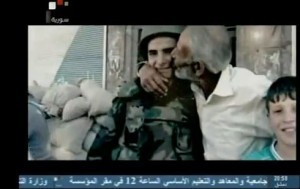Syrian Media Address Potential Strike

By Raheel Ibrahim*
(Damascus, Syria) – Television presenter Rasha Kassar introduced the 30th episode of Suria Tatahawar (Syria Discusses) on the official Syrian satellite channel with the following words:
“What is all this fuss about American statements and posturing that rational minds are describing as dangerous and tragic? Didn’t terrorists use Sarin gas in Spain, France and London? Didn’t the Turkish authorities give this deadly gas to the Nusra Front? Why have Western countries admitted in their statements to the presence of their citizens fighting in Syria without taking any measures to deter them? The West has become a source of terrorism.”

This episode, which featured such guests as a retired army officer, an expert in international law and another lawyer, all loyal to Syrian President Bashar al-Assad, alleged that “terrorists” from the Nusra Front had used sarin gas in Syria.
During the episode, panellists emphasized that the Syrian government was the first to call for an investigation into the use of chemical weapons in Khan Al-Asal in the province of Aleppo, in March. At the time, United Nations investigator Carla Del Ponte accused the opposition of being behind the attack but the UN did not back these claims.
The question of who used chemical weapons has become the lead story on official Syrian channels, which have been re-broadcasting footage of interviews with victims at Khan Al-Asal who said armed rebels were the ones who used chemical weapons. Official media is also emphasizing the Syrian army’s control over all its chemical weapons depots made by Saudi, Turkish and European companies, and which are kept in storage in Jobar and Ataiba on the outskirts of Damascus, as well as in Banias, Homs and Hama.
This Syrian media blitz reached its peak on August 31, when all the official and pro-regime private channels, such as state-run Channel One, Al-Akhbaria Al-Souria, Al-Fadaa’ia Al-Souria, as well as private channels Souria Drama, Al- Talaqi, and Sama (previously Al-Dunia), united in broadcasting patriotic songs and political speeches all day. The official Facebook pages of these channels also posted the same message addressed to the Syrian public asking them to “disregard any news shown by channels other than national ones, especially with regard to military operations or attacks that have occurred, or that aim to weaken morale.” The messages also warned citizens to rely on traditional means of communication such as the telephone in case of an attack that interrupted transmission.
Al-Akhbaria broadcast part of the September 2 United States Senate Foreign Relations Committee hearing live while hosting a political commentator, as well as running highlights from the meeting as breaking news at the bottom of the screen.
One recent report on Al-Akhbaria suggested that the regime would attack Israel in response to any US strike.
“If the United States leads a war on Syria, it will not control how it ends. Another front will be opened to respond to this aggression – the Palestinian front.”
The report even featured an interview with “Abu Jamal,” a pro-Assad fighter with the Popular Front for the Liberation of Palestine.
“We will not stand idly by while mercenaries sent by Qatar, Saudi Arabia and Turkey destroy the capabilities of Syria,” he said. “We trust the Syrian army, the people, and the leadership which embraced the resistance, and we will not let you down.”
The pro-regime channels have recently reduced their entertainment programs, especially locally-produced soap operas, in favour of political programs and talk shows. They are now devoted to showing footage of President Bashar al-Assad in military dress in the field among his soldiers, and broadcasting excerpts from previous speeches announcing Syria’s readiness to face any external aggression.
Al-Talaqi, a public station that partially funded by Rami Makhlouf, a powerful businessman and maternal cousin of the president, has continued some of its entertainment programming but has also broadcast the film “Nasser 56” which chronicles the war in 1956 between Egypt, led by then-Egyptian President Gamal Abdel Nasser, and the coalition of Israel, France and Great Britain, following the nationalization of the Suez Canal.
Ubada, a 26-year-old graduate of the Faculty of Media who supports Assad, said he was happy with the change in programming, but admitted that the official media is “slow” compared to the “media empires” with which it cannot compete.
“It is enough that these channels confronted the ministers of the Arab League when they decided to block the broadcasting of Syrian satellite channels,” he said. “These channels did their best to confront the blockade and now they’re doing their best to confront the war. More importantly, they have made Syrians proud and increased trust in the army.”
Wissam, 30, an opposition activist, had a different opinion.
“Syrian television has lived and continues to live in a rosy world,” he said. “If it wasn’t for the news ticker and breaking news we would not believe it was broadcasting from Syria.”
Apart from Syria, the official media also covers what has happened in Egypt since the overthrow of President Mohammad Morsi. Demonstrations, press conferences and Egyptian army statements as well as breaking news are broadcast live on the air. On September 1, the Syrian channel Sama and the Egyptian channel Al-Faraein jointly broadcast the program “Egypt Today,” with Tawfiq Okasha. A large portion of the episode was dedicated to the crisis in Syria, which was framed in terms of “fighting terrorism,” including the Muslim Brotherhood, supporting the army and police and “restoring security” to Egypt and Syria.
* Raheel Ibrahim is the pseudonym for a journalist living inside Syria.
